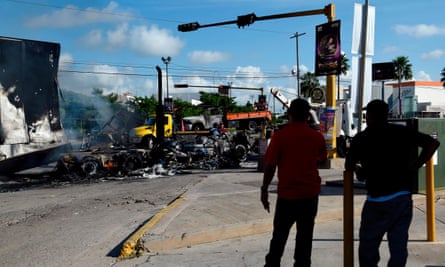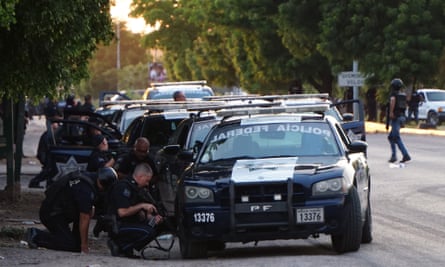Mexico’s president, Andrés Manuel López Obrador, has insisted that his government was right to release one of the sons of imprisoned drug lord Joaquín “El Chapo” Guzmán, a day after his brief capture by the army sparked a wave of attacks by cartel gunmen who took soldiers hostage and paralyzed the northern city of Culiacán.
“This decision was taken to protect citizens. You cannot fight fire with fire,” López Obrador said in his daily press conference on Friday morning. “We do not want deaths. We do not want war.”
But the aborted arrest – and the chaos that it unleashed – prompted accusations that the government had simply folded in the face of cartel firepower, and cast further doubt on the president’s efforts to overhaul Mexico’s security strategy.
“There is nothing admirable about this decision,” the security expert Alejandro Hope tweeted on Friday morning. “By launching a badly planned operation that was then badly executed, the government laid itself open to being blackmailed.”
Carlos Bravo Regidor, a professor at the Centre for Research and Teaching in Economics, tweeted: “First it was an operational disaster. Then it was communications disaster. And finally it was a political disaster.”
According to the official version, Ovidio Guzmán López was detained in a house in Culiacán between about 3pm and 5.30pm on Thursday, triggering a huge and extremely violent response from the cartel which led the authorities to withdraw from the house – leaving him behind.
“The capture of a criminal cannot be worth more than the lives of people,” López Obrador said.

At a rowdy press conference held by the country’s top security officials in Culiacán on Friday, the public security secretary Alfonso Durazo said that eight troops and one army officer were “held and later liberated” by the criminals, adding weight to reports that the captured soldiers were freed in exchange for Guzmán.
Durazo blamed the debacle on a group of police and soldiers who had jumped the gun with the attempt to arrest Ovidio.
“This is not about a state failing. What there was was a failed operation,” he said. “It was a rushed operation in which the reaction of the criminals was not taken into consideration.”
The scale of that reaction stunned Mexicans, as footage shared on social media showed heavily armed cartel gunmen in the streets with panicked residents fleing to a soundtrack of gunfire. At least eight people were killed and 21 wounded in the clashes.
Hundreds of cartel gunmen were deployed around the city of one million people, blocking streets with burning vehicles or riding about on pickup trucks with mounted .50 calibre machine guns. Durazo said that there were 14 separate attacks on the military and 19 roadblocks were thrown up across the city.
#ULTIMAHORA
— LaGaceta.me (@LaGaceta_me) October 17, 2019
Detienen al hijo de El Chapo Guzmán, Iván Archibaldo Guzmán, lo que está ocasionando una fuerte balacera en #Culiacán #Sinaloa en esta ciudad pic.twitter.com/MjqqLsu3sx
Videos also showed dozens of escaped prisoners flooding into the streets and commandeering passing vehicles at gunpoint. On Friday morning the local authorities confirmed that 49 prisoners were still at large.
Adding to the confusion, authorities were slow to communicate with the panicked population, offering no explanation or comment beyond calling on people to stay indoors.
The government, however, is struggling to convince observers that it does not bear responsibility for creating the problem in the first place.
Officials said it was triggered by the “precipitated” action by members of a patrol that launched into an operation to arrest Ovidio Guzmán, on a warrant with a view to extradition, without first having secured a judicial order allowing them entrance to the house.
The officials also insisted that the 29-year-old son of Mexico’s most infamous drug baron, who is also wanted in the US on drug trafficking charges, was never actually arrested because the formal procedures were not completed.
During his press conference López Obrador, known as Amlo, insisted that time would convince the Mexican public that his government was right in aiming to put avoiding conflict with the cartels.
“I ask the people of Mexico not to worry,” he said. “There will be no impunity because there is no collusion between the criminals and the authorities. The line is very clear.”
At least one video relating to Thursday’s events seemed to contradict this: the clip shows cartel gunmen exchanging handshakes and fist-bumps with soldiers on the streets of Culiacán.
It remained unclear how long Ovidio was held and whether there had been negotiations to secure his freedom.

Amlo also dismissed a question about whether the government’s willingness to let Ovidio Guzmán go had boosted the cartel’s power.
“How can this possibly strengthen an organization that uses violence?” he asked. “They don’t have reason on their side. If you use force you don’t have moral authority.”
The president argues his predecessors’ military-led offensives against the cartels have only exacerbated Mexico’s violence, but his focus on long-term crime prevention has failed to rein in the bloodshed, and the country of 125 million people now sees an average of 100 homicides every day.
Earlier this week, 13 police officers were killed in ambush by gunmen from the Jalisco New Generation cartel, one of the many groups contesting territory with the Guzmán’s Sinaloa federation.
Thursday’s events buried any assumption that the Sinaloa cartel had been weakened since El Chapo’s extradition; the brazen show of force far outscaled the group’s response on any of the three occasions when the kingpin himself was captured.
Until Thursday Ovidio had not been among the most well-known of El Chapo’s many children.
The highest profile of them is usually said to be Ivan Archivaldo, who was also rumoured to have been captured or killed during Thursday’s events.
Alhough calm has returned to the streets of Culiacán, tension and terror continued to reverberate on Friday. Schools were closed for the day, as were many public offices.
A lawyer for the Guzmáns said on Friday the family was grateful the security forces had treated Ovidio well.
José Luis González Meza told Radio Fórmula that the family had been deeply worried when Ovidio had “disappeared”. “Thank God it turned out he is alive, and his brother Ivan Archivaldo too,” the lawyer said.